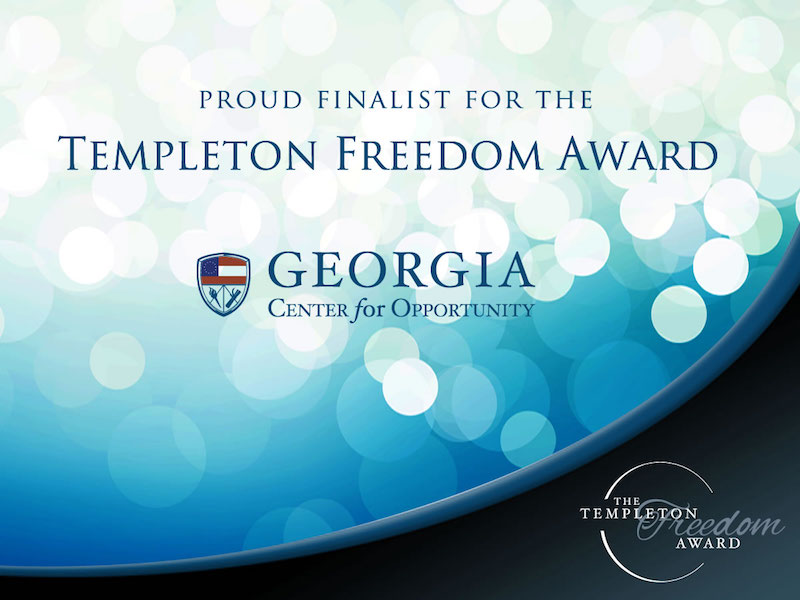
by Georgia Center for Opportunity | Sep 11, 2017
Amid growing acknowledgment for efforts to reduce prison recidivism rates in Georgia, the Georgia Center for Opportunity (GCO) has been named as a finalist for the highly competitive Atlas Network Templeton Freedom Award.
The honor recognizes GCO for recent efforts to assist formerly incarcerated individuals with successful reintegration into society. Through work with several community partners, the organization has orchestrated an effort that focuses on the rehabilitation and restoration of former offenders with their family and community. Aiming to help newly-released individuals gain employment and reconnect with their loved ones, GCO’s program has been credited with positively impacting the state’s justice system.
“We’re humbled to be considered as a global leader in promoting freedom and human flourishing, and congratulate the other finalists for their tremendous successes,” said Randy Hicks, President and CEO of GCO.
“Several hard-won policy changes and the work of many partners have contributed to a reduction of inmates in the state’s prison system,” Hicks added. “We predict the reforms spearheaded by GCO will continue to allow more individuals to successfully reenter society and become less likely to recidivate.”
The Atlas Network’s CEO, Brad Lips, praised GCO’s innovative approach to criminal justice reform.
“GCO’s Prisoner Reentry Initiative demonstrates that compassion for the incarcerated and their families can be aligned with the interests of taxpayers and public safety,” Lips said. “It’s a wonderful initiative that deserves to be emulated.”
GCO is included among seven globally-selected finalists who have made strides in public policy that encourage prosperity, innovation, and human fulfillment via free competition. Other finalists include the Beacon Center of Tennessee, based in Nashville, Tenn., the IMANI Center for Policy and Education, based in Accra, Ghana, Instituto de Estudos Empresariais (IEE), based in Porto Alegre, Brazil, Instituto Mexicano para la Competitividad (IMCO), based in Mexico City, Mexico, and the Macdonald-Laurier Institute for Public Policy (MLI), based in Ottawa, Canada.
All finalists will receive $25,000, while the winning organization will receive $100,000.
The winner of the Atlas Network’s Templeton Freedom Award will be announced during the Liberty Forum and Freedom Dinner in New York City on November 8.
To learn more about policy solutions championed in GCO’s prisoner re-entry work visit GeorgiaOpportunity.org/Employment/Prisoner-reentry.

by Georgia Center for Opportunity | Aug 28, 2017
In the coming decades, could so-called “middle skills” jobs be a key factor in reversing the contemporary epidemic of non-working males in the U.S.? There is reason to hope the answer is a resounding yes.
A phenomenon thoroughly documented by the American Enterprise Institute’s Nicholas Eberstadt and other scholars, an estimated seven million men in their prime working years of 25 to 54 years-old are absent from the U.S. labor force. Several factors tend to characterize these men: they are more likely to be minorities (particularly African-American), undereducated (no more than a high school diploma, and often less), and with a history in the criminal justice system. One attribute characterizes all of them—they are entirely disconnected from work. They’ve dropped out, unplugged, and given up on joining the labor force altogether.
Reasons for this are multifaceted, running the gamut from the challenges of obtaining work with a criminal record to addictions (alcohol and opioids particularly) to reliance on disability payments, family members, or government support to survive.
Closer to home in Georgia, this impactful map created by The New York Times shows where the non-working male problem is particularly bad, including areas where northward of 42% of these males are non-working, spanning Georgia’s larger metro areas to small rural regions.
Could middle-skills jobs be key to reducing this trend? It’s estimated that 29 million middle-skills jobs exist in the US today—40 percent of them with annual salaries in excess of $50,000 (for more, download this PDF). These jobs require less than a bachelor’s degree but more than a high-school diploma, making shorter-term training programs and credentials—such as associate degrees, certificates, and apprenticeships—an ideal option. Click here for more on the demand for middle skills jobs in Georgia.
There are a number of reasons to hope that we can achieve some success by placing more emphasis on these types of alternatives:
- Offering guided training pathways that lead to a workforce-ready credential will give non-working men a greater motivation to engage, compared to the six (or more) years needed to finish a typical bachelor’s degree.
- Offering “stackable credentials” that allow students to gradually and sequentially build their skillset over a period of time will allow these men to quickly see progress and ROI in their training journey.
- Building condensed and accelerated training schedules would empower men to finish what they start and improve graduation rates at community colleges and other training programs.
The Georgia Center for Opportunity is committed to making these kinds of opportunities available for all Georgians through our College and Career Pathways Initiative.

by Georgia Center for Opportunity | Aug 25, 2017
Being a dad is one of the greatest challenges in life, but it often gets overlooked. Though the everyday joys of being a father are overshadowed in pop culture by fast-paced news and Hollywood gossip, that doesn’t mean celebrity dads aren’t talking about how their kids are changing their lives for the better.
Beginning August 25, the Georgia Center for Opportunity’s Healthy Families Initiative is introducing #FatherhoodFridays on social media, celebrating fatherhood in pop culture. The launch begins with a series of graphic ads featuring celebrity quotes highlighting the joys of parenthood.
HFI is currently preparing for two fall classes on fatherhood. Conversations of a Father, which is accepting registrations for the dates of September 30 and October 14. The full-day class for men reinforces characteristics they need to be good fathers, 24 hours a day, seven days a week. The class is free to attend, and breakfast and lunch will be provided.
For more information, visit the Healthy FamiliesInitiative online.
You can check out the series below, or watch for the ads every Friday on Facebook.







by Georgia Center for Opportunity | Aug 22, 2017
Advocates for school choice have long argued that charters encourage higher performance among all public schools. But is it possible that local students could benefit from the presence of a charter school even if they never go to school there? According to a recent study, the answer is yes.
In New York City, Temple University Professor Sandra Cordes found that the establishment of charter schools had a positive impact on the educational quality of the area.
According to Cordes’ research, charters drove up overall reading and math scores of traditional public schools, and also reduced the number of students held back a grade by as much as 20 to 40 percent.
In an interview with the Atlantic, Cordes explained that competition was the main catalyst for improvement.
“I think having that close a proximity might really get administrators to get their act together,” she said.
Parents could also see the difference in their kids. Moms and dads surveyed as part of the study claimed seeing “significantly higher student engagement.”
Cordes’ findings are soon to be published in the journal Education Finance and Policy. You can read her peer-reviewed study here, or check out the Atlantic article here.

by Georgia Center for Opportunity | Aug 16, 2017
When the great recession hit in 2007, economists weren’t surprised to find that young couples held off on starting families. However, ten years later, they’ve found that the birth rate hasn’t yet bounced back. Now, some experts fear that fewer babies could equal problems for the economy down the road.
In 2016, the U.S. birthrate hit a low only comparable to the Great Depression, according to Ohio-based Dayton Daily News. While 4.3 million were born in 2007, only 3.9 million were born last year. The decrease spans all ethnic backgrounds, while the average childbearing age has increased overall.
It could mean trouble for the education system and workforce in years to come, as education funding and the number of hirable, skilled men and women could drop.
A number of factors contribute to why young families may be pushing off plans to have children. The report points to concerns over rising debt- including college loans- and insecurity over the job market.
“They’re very nervous about their ability to become financially secure,” said Corey Seemiller, an assistant professor of organizational leadership at Wright State University.
The Georgia Center for Opportunity offers a number of resources for men and women who are working to ensure their family’s stability. Through the Healthy Families Initiative (HFI), HFI is offering a full lineup of courses in the fall and will soon offer classes online. Check out upcoming class dates here.










